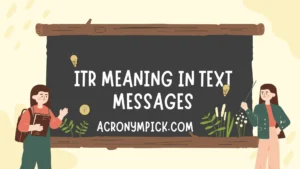In the fast-evolving world of digital communication, abbreviations and acronyms are constantly emerging, shaping the way we talk online. One such abbreviation gaining traction, especially among younger users, is ICMB. If you’ve ever seen someone text “ICMB” and weren’t sure what it meant, you’re not alone. In this article, we’ll break down exactly what ICMB means in text, how it’s used, and why it’s important to understand its tone and context.
What Does ICMB Mean in Texting?
At its core, ICMB stands for “I’ll Call You Back.” It’s a quick and informal way for someone to let you know they’re currently unavailable but will reconnect later. It’s commonly used in texting, instant messaging, and chat apps like WhatsApp, Messenger, or iMessage.
✅ Example:
- You: Hey, can we talk for a sec?
- Them: ICMB, just stepped into a meeting.
It’s short, efficient, and fits perfectly in a world where people want to respond quickly without typing full sentences.
Why ICMB Is Used Instead of Typing It Out
In today’s texting culture, speed and efficiency are king. Abbreviations like ICMB save time, especially when someone is multitasking or in a rush. It also helps to keep conversations casual without sounding dismissive.
Here’s why someone might choose to use ICMB:
- They’re currently busy (in a meeting, driving, etc.)
- They want to acknowledge your message without ignoring you
- They plan to follow up later via a call
It’s polite, yet efficient—offering both reassurance and brevity.
Variations & Similar Abbreviations
While ICMB means “I’ll Call You Back,” there are a few similar phrases people might use:
| Abbreviation | Meaning |
|---|---|
| BRB | Be Right Back |
| TTYL | Talk To You Later |
| CMB | Call Me Back |
| BBL | Be Back Later |
| GTG | Got To Go |
Some users might drop the “I’ll” altogether and just use CMB, which also means Call Me Back. However, ICMB is slightly more specific and courteous because it puts the responsibility on the sender to follow up.
Origins of ICMB in Texting Slang
ICMB likely evolved from common speech and texting habits. The phrase “I’ll call you back” has long been used during phone conversations, especially when people are busy. As texting replaced many of our voice calls, people started shortening these spoken habits into acronyms.
ICMB became more common with the rise of:
- SMS culture (limited character counts pushed abbreviation use)
- Instant messaging apps like BBM, WhatsApp, and iMessage
- Professional multitasking, where quick replies are valued
It’s a natural evolution of modern communication, shaped by convenience and social expectation.
How ICMB Is Used Across Different Platforms
The way ICMB is used may slightly vary based on the platform, but the core meaning remains the same. Let’s explore some use cases.
📱 Text Messaging (iPhone/Android)
ICMB is most commonly used in direct messages when someone is currently unavailable.
Example:
“Hey, saw your text. ICMB when I’m free.”
In WhatsApp chats, especially with voice note users, ICMB can replace long explanations.
“ICMB after this voice note finishes playing.”
📸 Snapchat & Instagram DMs
Here, ICMB is used in casual chats, often to signal a call might follow soon.
“Can’t snap right now, ICMB.”
💻 Work Chats (Slack, Microsoft Teams)
In informal workplace communication, ICMB might be used between colleagues.
“On a client call, ICMB in 15.”
It’s important to note that ICMB is still casual, so it may not be appropriate in highly formal or corporate emails.
Tone and Intent: What ICMB Really Communicates
Text abbreviations often carry subtle meanings beyond their literal translation. ICMB may seem like a simple message, but the tone and context matter.
When ICMB Feels Sincere:
- You’re in a meeting, driving, or running errands
- You genuinely intend to return the call
- You want to acknowledge the other person’s importance
When ICMB Feels Dismissive:
- No follow-up ever happens
- It’s used repeatedly as an excuse
- It ends the conversation without closure
How someone interprets ICMB often depends on the nature of the relationship—friends, coworkers, romantic partners, etc. That’s why it’s always a good idea to follow through if you send it!
Common Misunderstandings About ICMB
Let’s clear up a few misconceptions:
❌ ICMB Does Not Mean:
- “I Can’t Message Back” – While it might make sense, that’s not the accepted definition.
- “Incoming Call Might Be…” – ICMB has nothing to do with call notifications or caller IDs.
- Anything technical or government-related (unlike ICBM, which refers to missiles)
Stick to “I’ll Call You Back” as the correct interpretation when seen in texting contexts.
ICMB in Pop Culture or Media
While ICMB hasn’t hit mainstream media or pop culture the way some slang terms like “YOLO” or “LOL” have, it’s still part of the modern digital dialect. You may see it used in:
- Text meme pages
- Tweet replies
- Instagram captions
- TikTok DMs
It’s often used by Gen Z and Millennials, especially those who want to keep convos light, minimal, and direct.
Who Uses ICMB the Most?
Although anyone can use ICMB, it’s more common among:
- Busy professionals who are often in meetings
- Students who are in class or on campus
- Parents juggling tasks
- Teens/young adults in casual conversations
The abbreviation is especially useful for maintaining communication etiquette—letting someone know you’re not ignoring them, just busy.
How to Respond When Someone Texts You ICMB
Knowing how to reply to “ICMB” depends on your relationship and what you need from the conversation.
Friendly Response:
“Cool, talk soon 😊”
Romantic Interest:
“Okay! I’ll wait for your call 💖”
Work-Related:
“Sounds good. Ping me when you’re back.”
Avoid spamming the person or double-texting if they’ve said they’ll call back—respect their time, just as you’d want them to respect yours
Conclusion
In today’s digital world, communication is faster and shorter than ever. Abbreviations like ICMB—meaning “I’ll Call You Back”—help us stay connected while juggling busy schedules. It’s a practical, polite way to say “I’m not available right now, but I value our conversation enough to follow up later.”
Whether you’re using ICMB yourself or receiving it from someone else, it’s important to understand both its literal meaning and the emotional tone behind it. Respond appropriately, follow up when you say you will, and don’t be afraid to ask for clarification if something feels unclear.
By staying aware of evolving texting trends, you can communicate more clearly, respectfully, and efficiently in any digital space.












